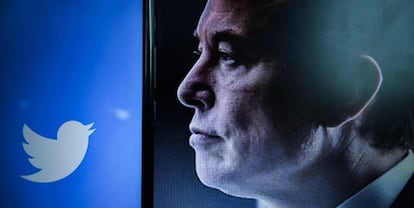Twitter cannot be solved, @ElonMusk
Social networks require a balance between freedom and moderation. We will soon find out if Musk knows this: is he aware of the juggling required to keep Twitter functioning, or does he bring the audacity of a savior?

My title may suggest that I’m going to explain why you should get off Twitter. But it’s the opposite: I think Twitter is fine. Would it be better without insults and censorship? Yes, but you can’t have both at the same time. Twitter will never be perfect, even if its users and Elon Musk, its recent buyer, want it to be. The application is a small example of a great truth: utopianism leads to dystopianism and unhappiness.
Some things are necessarily imperfect because of our own contradictory expectations. It happens with couples, friends, cities and entire countries. They are plagued by inevitable dilemmas: Do you want to live in a society where you can scream whenever you feel euphoric, or would you prefer to ban screaming and sleep peacefully every night? Order and spontaneity are incompatible virtues. We want a world where someone protects us from our mistakes, but also where someone else makes our decisions. Our dreams are unrealizable because they collide with each other. That is why no ideal world can exist, as Isaiah Berlin said: “You cannot have everything you want, neither in practice nor in theory.”
And no ideal Twitter can exist either. I have been on the social network for 15 years. It has been important to my life, and it still serves me well. My impulse is to despise it, but the truth is that I met good friends there, I articulate my ideas there and I owe to it a job that I love. Being a journalist in 2022 is about discovering true facts and getting someone to pay attention to them. The second lesson I learned from Twitter.
But Twitter is defined by conflicts that Elon Musk will not be able to solve. They are problems with no solution.
How much freedom do we want? Nobody dreams of a network where a totalitarian government decides what is legal to express. But without moderating the conversation, networks are filled with spam, scams, insults and abuse, especially against women and minorities. An uncontrolled Twitter will be a cesspool. A Twitter where insults are illegal will be terrifying.
Whose do we want it to be? Twitter is not “the public square,” as Elon Musk has said, but rather a bar in that square, if the square is the entire internet. But who should rule the bar? It’s easy to say what we don’t want and why: we don’t want it to be state-run, or we’ll have the Chinese problem; we don’t want it to be owned by a plutocrat, or we’ll have the Musk problem. A third alternative is for it to not belong to anyone, for it to become an open and decentralized protocol. The option tempts me, but it also has its costs: the Wild West tends to lend itself well to unsavory behavior. In the current equilibrium, it remains private and regulated, a bland but acceptable option.
Do we want it to be transparent? Twitter’s dilemmas go down to its technical details. One of Musk’s proposals is that the algorithm that governs the network be made public, so we can know what parameters decide whether a tweet is shown to 30 or 30,000 followers. The proposal sounds good to me. I’d like to know what determines each timeline and why fights are amplified. But the decision has its own issues: an opaque algorithm can protect the network from those who want to manipulate it to go viral.
I’m sure Twitter can be improved. There are ways for people to be less obnoxious—less idiotic—when hiding behind a digital avatar. Perhaps experience is enough, and young people will grow up to be better humans on the internet. But other aspects cannot be solved. They are tensions that we can only aspire to balance out.
My concern now is whether Elon Musk knows this. Is he aware of the juggling required to keep Twitter intact, or does he bring the audacity of someone who believes in utopia? We will have to see. I tend to think of technologists as useful people. My biases, from my love of science fiction to my engineering degree, are in their favor. But technologists have a danger: they believe that everything has a solution. And that idea is false. If you are forbidden from swimming in a turbulent sea, you will know that your children will not drown. But you will not be free to plunge into the wild ocean’s waters.
Tu suscripción se está usando en otro dispositivo
¿Quieres añadir otro usuario a tu suscripción?
Si continúas leyendo en este dispositivo, no se podrá leer en el otro.
FlechaTu suscripción se está usando en otro dispositivo y solo puedes acceder a EL PAÍS desde un dispositivo a la vez.
Si quieres compartir tu cuenta, cambia tu suscripción a la modalidad Premium, así podrás añadir otro usuario. Cada uno accederá con su propia cuenta de email, lo que os permitirá personalizar vuestra experiencia en EL PAÍS.
¿Tienes una suscripción de empresa? Accede aquí para contratar más cuentas.
En el caso de no saber quién está usando tu cuenta, te recomendamos cambiar tu contraseña aquí.
Si decides continuar compartiendo tu cuenta, este mensaje se mostrará en tu dispositivo y en el de la otra persona que está usando tu cuenta de forma indefinida, afectando a tu experiencia de lectura. Puedes consultar aquí los términos y condiciones de la suscripción digital.









































